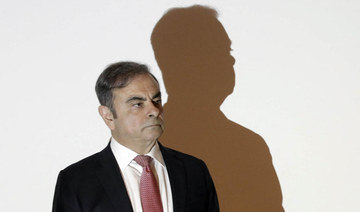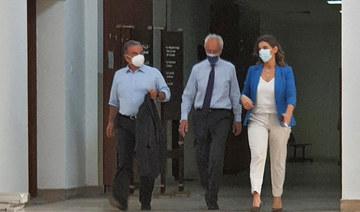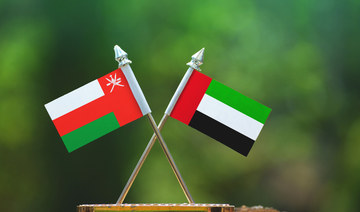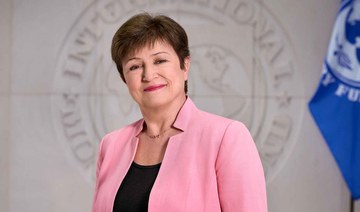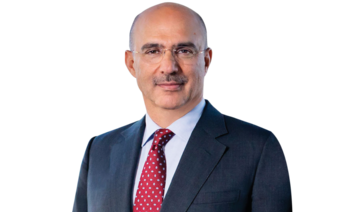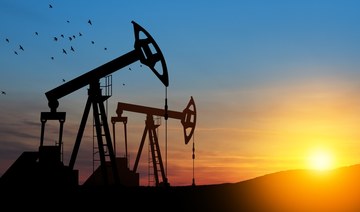TOKYO: An American father-son duo admitted their role in orchestrating former Nissan chief Carlos Ghosn’s audacious escape from Japan as they made their first appearance before a Tokyo court on Monday.
Former special forces operative Michael Taylor, 60, and his 28-year-old son Peter were extradited by US authorities over claims they smuggled Ghosn out of the country in a music equipment case as he awaited trial.
At the Tokyo district court, the pair said they did not contest the facts laid out by prosecutors in an indictment, effectively conceding their role in the saga.
“Is there any mistake in what the prosecutor just read?” the judge asked each man in turn. Both replied no.
Michael Taylor was led in first to the courtroom, with his hands cuffed in front of him. He wore plastic slippers, dark trousers and a white shirt with no tie.
His son was brought in after, with both men wearing facemasks.
The pair face up to three years in prison if convicted of helping Ghosn — currently an international fugitive living in Lebanon, which has no extradition treaty with Japan.
Ghosn was out on bail while awaiting trial on four counts of financial misconduct, which he denies, when he managed to slip past authorities onto a private jet, transit in Turkey and land in Lebanon.
On Monday, prosecutors laid out again the almost cinematic details of the December 2019 escape, including that the Taylors hid Ghosn in a case to slip him past security at an airport.
“You helped him escape,” he said to the two men, who listened to proceedings through a translation earpiece.
Ghosn’s flight was hugely embarrassing for Japanese authorities, with US prosecutors calling it “one of the most brazen and well-orchestrated escape acts in recent history.”
The Taylors fought their extradition to Tokyo, claiming they could face torture-like conditions, and have not commented on their case since arriving in early March.
Local prosecutors declined to comment on their arraignment before the trial, but Japanese media said both men admitted wrongdoing during questioning.
Public broadcaster NHK has said Peter received 144 million yen ($1.3 million) from the Ghosns for their help.
The Asahi Shimbun daily said the pair spent most of the money on preparations for the escape, including the costs of chartering a private jet, claiming that they were not paid for their help.
Ghosn remains at large in Lebanon, where he was questioned last month by French investigators over a series of alleged financial improprieties.
Among the allegations are improper financial interactions with Renault-Nissan’s distributor in Oman, payments by a Dutch subsidiary to consultants and lavish parties organized at the Palace of Versailles.
The questioning took place with his defense team and a Lebanese prosecutor present. Ghosn was heard as a witness as he would need to be in France to be formally indicted.
Others involved in the Ghosn case have faced legal proceedings, including his former aide at Nissan, Greg Kelly, who is also on trial in Tokyo for his alleged role in underreporting the tycoon’s income.
And a Turkish court has sentenced two pilots and another employee of a small private airline to four years and two months in prison for their role in Ghosn’s escape.
Ghosn switched planes in Turkey on his way to Lebanon, and the three Turks were charged with involvement in a conspiracy to smuggle a migrant.
A Lebanese national still at large is also suspected of orchestrating Ghosn’s escape from Japan.
US father-son duo admit helping ex-Nissan chief Ghosn flee Japan
https://arab.news/6wfu8
US father-son duo admit helping ex-Nissan chief Ghosn flee Japan
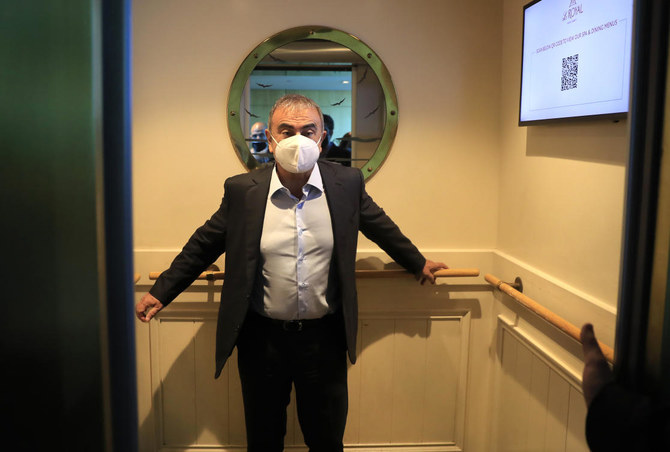
- Ghosn was out on bail while awaiting trial on four counts of financial misconduct, which he denies, when he managed to slip past authorities onto a private jet, transit in Turkey and land in Lebanon
Omani officials forge economic alliances with Saudi Arabia, Japan, and US
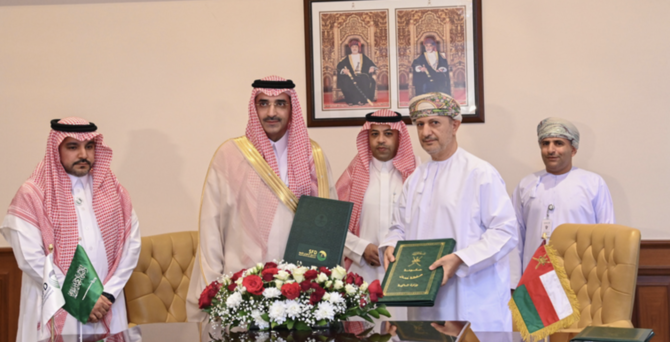
RIYADH: Oman’s industrial infrastructure is set to receive a boost following a new agreement with Saudi Arabia, fostering private sector participation in the country’s economic growth.
A memorandum of understanding, aimed at financing the infrastructure of several industrial zones in Oman, was signed during a meeting between Minister of Finance Sultan bin Salem Al-Habsi and Sultan Abdulrahman Al-Marshad, CEO of the Saudi Fund for Development, the Oman News Agency reported.
Discussions centered on cooperation mechanisms between Oman and the fund, along with updates on collaborative development projects.
The aim is to develop the industrial and logistical sectors by providing all necessary basic services, thereby encouraging the private sector to contribute to Oman’s economic development in line with Oman Vision 2040, as reported by the agency.
This memorandum falls within the framework of cooperation between the two parties to support developmental areas in Oman. These encompass infrastructure, higher and vocational education programs, and water, along with the industry and mining sectors. Additionally, it includes transportation and communications sectors, as well as developmental projects in the energy sector.
On another note, Ali bin Masoud Al-Sunaidi, chairman of the Public Authority for Special Economic Zones and Free Zones, met with Ken Saito, minister of economy, trade and industry of Japan, and his accompanying delegation in Tokyo.
During the meeting, they reviewed the business cooperation between the two countries and the major projects under construction in the economic and free zones and industrial cities in Oman, notably the low-carbon iron production project in the Special Economic Zone in Duqm.
The visit also included meetings with officials from companies engaged in iron and its derivatives production, and renewable energy equipment manufacturing companies, as well as a visit to Yokohama Port to learn about its experience in receiving ships specialized in energy and petroleum product transportation.
Also on April 24, Oman and the US explored ways to enhance trade, investment, and address challenges comprehensively during the second strategic dialogue held in Washington.
The Omani side was chaired by Sheikh Khalifa bin Ali bin Issa al-Harthy, undersecretary for Diplomatic Affairs, Ministry of Foreign Affairs, while the US side was chaired by Jose Fernandez, undersecretary of state for Economic Growth, Energy, and the Environment.
Both sides discussed opportunities for American companies in Oman, focusing on ICT, semiconductors, and clean energy services, expressing commitment to enhancing cooperation in clean energy solutions and mineral investments.
They addressed environmental priorities under the Omani-American cooperation memorandum, fostering communication between researchers from both countries for clean energy research.
Saudi NHC, Spain’s Urbas to construct almost 600 housing units in Al-Fursan suburb
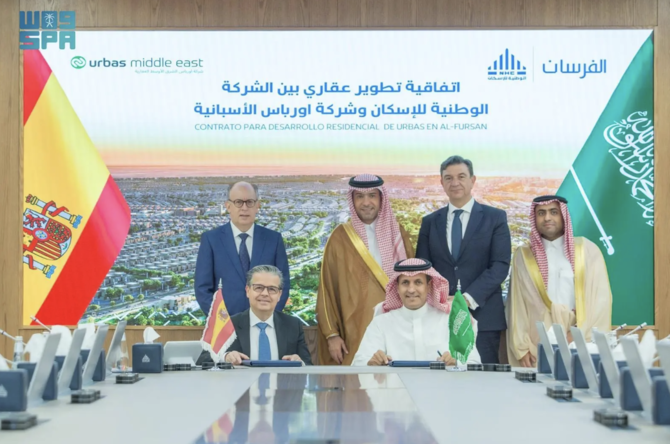
RIYADH: Saudi Arabia’s Al-Fursan suburb will soon be home to 589 new residential units worth around SR1 billion ($266 million) thanks to a deal sealed by the National Housing Co.
Inked with Urbas Middle East Real Estate Co., a subsidiary of the Spanish Urbas Group, the agreement involves the development as well as construction of the housing units on an area spanning 150,000 sq. m, the Saudi Press Agency reported.
This collaboration marks a significant milestone in the development of the Al-Fursan suburb. It also promises to set new standards in property development.
“This agreement complements the efforts of the recent visit to Spain and continues to attract international investments with major companies to provide various housing products that fulfill and meet the desires of citizens,” Saudi Minister of Municipal and Rural Affairs and Housing Majid Al-Hogail said in a post on X.
“As an extension of our journey in attracting the best international experiences and expertise in the real estate development industry, I was pleased to meet the CEO of the Spanish company Urbas, which is planned to be one of the companies developing the Al-Fursan neighborhood project in Riyadh,” Al-Hogail added.
The minister also highlighted how this step will contribute to providing innovative housing options and facilitate the exchange of experiences between Saudi and international developers.
IMF surcharges on borrowings exacerbate global inequities: report
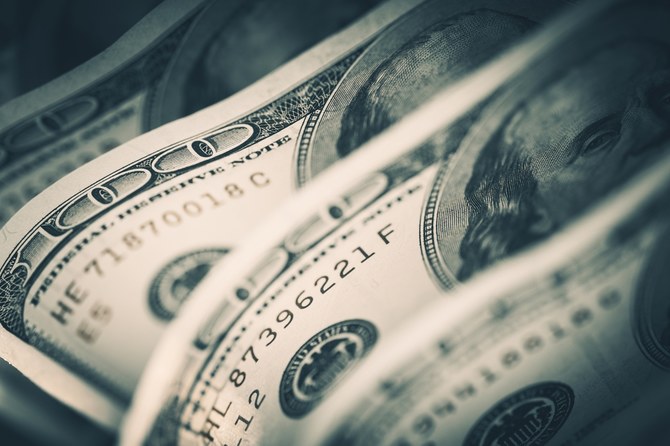
BENGALURU: Countries, mostly middle and lower-income, have been burdened by surcharges on top of interest payments on their borrowings from the International Monetary Fund, widening global inequities, according to a report by US think tanks.
WHY IT’S IMPORTANT
Indebted member countries paid about $6.4 billion in surcharges between 2020-2023, the report from Boston University’s Global Development Policy Center and Columbia University’s Initiative for Policy Dialogue released on Tuesday showed.
And the number of countries paying these surcharges has more than doubled in the last four years.
The IMF is expected to charge an estimated $9.8 billion in surcharges in the next five years, according to an earlier report by the Center for Economic and Policy Research.
Critics of the policy argue that surcharges do not hasten repayment and instead punish countries already struggling with liquidity constraints, increase the risk of debt distress and divert scarce resources that could be used to boost the struggling economies.
BY THE NUMBERS
Countries such as Ukraine, Egypt, Argentina, Barbados and Pakistan pay the most in surcharges, the report showed, accounting for 90 percent of the IMF’s surcharge revenues.
These surcharges, levied on top of the fund’s increasingly steeper basic rate, are IMF’s single largest source of revenue, accounting for 50 percent of total revenue in 2023.
KEY QUOTES
“IMF surcharges are inherently pro-cyclical as they increase debt service payments when a borrowing country is most need of emergency financing," Global Development Policy Center’s Director Kevin Gallagher said.
“Increasing surcharges and global shocks are compounding the economic pressure on vulnerable countries.”
CONTEXT
Data published by the Institute of International Finance earlier this year showed global debt levels hit a record of $313 trillion in 2023, while the debt-to-GDP ratio — a reading indicating a country’s ability to pay back debts — across emerging economies also scaled fresh peaks.
IMF shareholders agreed last week on the importance of addressing challenges faced by low-income countries, Managing Director Kristalina Georgieva said on Friday.
China’s wealth fund joins with Bahrain’s Investcorp for $1bn Middle East investment
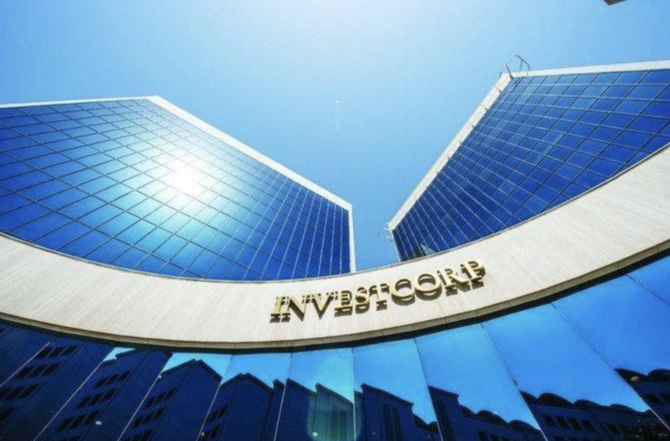
RIYADH: China’s growing interest in the Middle East continues as the country’s sovereign wealth fund partnered with Bahrain’s Investcorp to establish a $1 billion investment pot.
According to a press statement, Investcorp Golden Horizon fund will assist companies across Saudi Arabia, the wider Gulf Cooperation Council region and China.
The reserve will be anchored by reputable institutional and private investors from the GCC, as well as China Investment Corp.
The press statement revealed that target companies are expected to have high growth potential in sectors including consumer, health care, logistics and business services.
“During the past couple of years, we have built several bilateral funds with leading financial institutions to facilitate industrial cooperation between China and major economies in the world,” said Bin Qi, executive vice president and chief information officer at CIC.
He added: “Currently, we are working closely with Investcorp to build a similar bilateral fund to strengthen financial and industrial ties between China and GCC countries.”
This commitment from CIC comes when the GCC’s appeal to institutional investors is gathering pace, thanks to its stable regulatory environment and pro-business policies, driven by economic diversification efforts in the region and strategic privatization mandates.
“This commitment by CIC, one of the world’s largest sovereign wealth funds, is a testament to Investcorp’s unparalleled franchise in the GCC and reinforces the trust placed in the firm’s global platform and teams. We are looking forward to building on this relationship and growing our partnership in the future,” said Mohammed Al-Ardhi, executive chairman of Investcorp.
Co-CEO of Investcorp Hazem Ben-Gacem said the launch of the new fund will facilitate cross-border cooperation and investments between the GCC and China.
Trade and economic relationships between the Middle East and China have always been strong.
In 2023, China’s exports to Saudi Arabia and the UAE amounted to $42.86 billion and $55.68 billion respectively.
On the other hand, the Asian giant’s imports from Saudi Arabia totaled $64.36 billion in 2023.
In November, Saudi Arabia’s central bank, also known as SAMA, and the People’s Bank of China signed a local currency swap agreement worth $6.93 billion.
SAMA, in a statement, said that the three-year agreement “has been established in the context of financial cooperation between the Saudi Central Bank and the People’s Bank of China.”
The Asian country’s central bank said that the agreement will help strengthen financial cooperation between Saudi Arabia and China, promote the use of local currencies, and strengthen trade and investments between nations.
Oil Updates – crude steady as market weighs US demand concerns, Middle East conflict risks
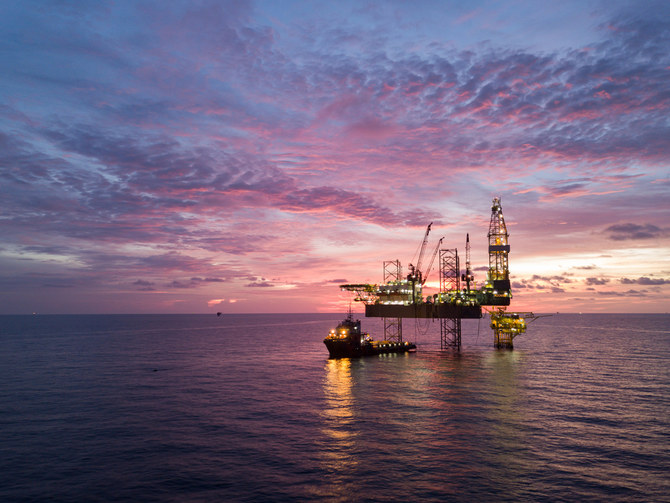
SINGAPORE: Oil prices steadied on Thursday after settling lower in the previous day, as signs of retreating fuel demand in the US, the world’s biggest oil user, contended with widening conflict risks in the key Middle East producing region, according to Reuters.
Brent crude futures inched up 18 cents, or 0.2 percent, to $88.20 a barrel at 9:30 a.m. Saudi time, while US West Texas Intermediate crude futures gained 13 cents, or 0.2 percent, to $82.94 a barrel.
Data from the US Energy Information Administration on Wednesday showed that gasoline stockpiles fell less than forecast while distillate stockpiles rose against expectations of a decline, reflecting signs of slowing demand.
The falling fuel demand is occurring amid signs of cooling US business activity in April and as stronger-than-expected inflation and employment data means the US Federal Reserve is more likely to delay expected interest rate cuts, weighing on economic sentiment.
“The current weakness in benchmark prices, after testing above $90 (a barrel) levels, is due to market sentiment refocusing on global economic headwinds over geopolitical tensions,” said Emril Jamil, senior oil analyst at LSEG Oil Research.
Geopolitics aside, prices this quarter will be driven by factors including major producer supply cuts, economic data out of China and Eurozone, on top of incremental demand expectations as the Northern Hemisphere heads into summer amid expected tighter supply, said Jamil.
A better indication of the Fed’s rate intentions will be seen after US gross domestic product and March personal consumption expenditure data is released on Thursday and Friday.
Meanwhile, fighting in the Gaza Strip between Israel and Hamas is expected to expand as Israel may start an assault on Rafah, in the enclave’s south, which may increase the risk of a wider war that could potentially disrupt oil supplies.
However, there have been no other signs of direct conflict between Israel and Hamas-backer Iran, a major oil producer, since last week.
“Tensions between Iran and Israel have eased, but Israeli attacks on Gaza are expected to worsen, and the risk of conflicts spreading to neighboring countries is underpinning oil prices,” said Toshitaka Tazawa, an analyst at Fujitomi Securities Co. Ltd.
Other EIA data on Wednesday showed that crude stocks slumped by 6.4 million barrels to 453.6 million barrels, compared with expectations in a Reuters poll for an 825,000-barrel rise.



